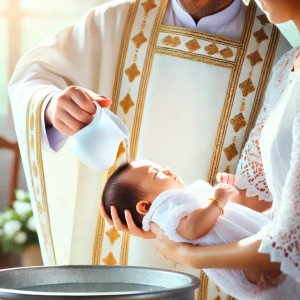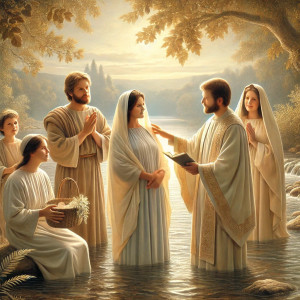Circumcision, in Genesis 17:12, was the sign of the Old Covenant, applied to boys on the eighth day of life. Baptism, as the new circumcision, as taught in Colossians 2:11-12, replaces this rite, allowing children to be included in the New Covenant and receive God's grace.
The Catechism of the Catholic Church (CIC 1250) teaches that children, born with fallen human nature due to original sin, need to be freed through Baptism. Although infant Baptism is not explicitly mentioned in Scripture, children are included in the salvific plan, as all need purification.
In Matthew 28:19, Jesus commands his disciples: 'Go therefore and make disciples of all nations, baptizing them...' The command given by Jesus does not exclude children. While this biblical passage does not directly reference infant Baptism, it can be understood that all nations especially include children of all ages.
In Acts 2:38-39, Peter says that the promise of Baptism is for 'you and your children.' Although there is no direct reference to infant Baptism, the mention of children indicates that the promise of salvation through Baptism includes children, opening the possibility for their Baptism.
In Acts 16:15 and Acts 16:33, we see Lydia and the jailer being baptized with 'their entire household.' The practice of baptizing entire families, though it does not specifically mention children, suggests that Baptism of members of all ages, including the youngest, was part of apostolic tradition.
In 1 Corinthians 1:16, Paul mentions that he baptized 'the household of Stephanas,' reinforcing the pattern of baptizing entire families. Although Scripture does not detail the presence of children in these events, tradition suggests that they were included in Baptism, just as they were circumcised in the Old Covenant.
Romans 5:18-19 states that original sin affects everyone, including newborns. While infant Baptism is not explicitly detailed in this text, the need for purification from original sin suggests that Baptism is also necessary for children.
In Luke 18:15-16, Jesus welcomes children and says: 'Let the children come to me, for the kingdom of God belongs to them.' While infant Baptism is not mentioned, this invitation from Jesus shows that children are worthy of receiving grace, justifying the practice of infant Baptism.
Finally, in John 3:5, Jesus teaches that 'no one can enter the kingdom of God unless they are born of water and Spirit.' This applies to everyone, including children, who also need the grace of Baptism, even though the text does not explicitly mention infant Baptism.
Testimony of the Church Fathers:
The Church Fathers support the practice of infant Baptism from the earliest centuries. Origen (c. 185-254 AD) stated that infant Baptism was a tradition received from the apostles. In his Homilies on Leviticus, he says that the Church baptizes children because, even from birth, they are stained by original sin.
Saint Irenaeus of Lyons (c. 130-202 AD), in Adversus Haereses, writes that Jesus 'came to save all people, including children, young people, and adults,' reinforcing the inclusion of children in the plan of salvation through Baptism.
Additionally, Saint Cyprian of Carthage (c. 210-258 AD) defended in a letter the Baptism of children, even before the eighth day, responding to a question raised about the practice. He reaffirms that no soul should be deprived of God's saving grace.
These testimonies show that, even without explicit mention in Scripture, the practice of infant Baptism was widely accepted and defended in Christian tradition from the earliest centuries, as part of the transmission of faith received from the apostles.

Baptism as the New Circumcision
In Colossians 2:11-12, Baptism replaces circumcision as the sign of the New Covenant. Just as in the Old Covenant, infant Baptism allows children to receive God's grace and be included in the family of faith.

Biblical Basis and Apostolic Tradition
Acts 16:15 and 1 Corinthians 1:16 show the Baptism of 'entire households.' While Scripture does not explicitly mention children, tradition suggests they were included, as has been practiced since the earliest centuries, with support from the Church Fathers.

The Need for Baptism in Children
Jesus says that 'no one can enter the Kingdom of God unless they are born of water and Spirit' (John 3:5). The Church understands this applies to everyone, including children, who need the grace of Baptism to be cleansed from original sin (CIC §1250).
-
CIC 403: States that from the earliest times, the Church has baptized children, believing they are affected by original sin.
-
CIC 1250: Speaks about the Baptism of children to free them from original sin.
-
CIC 1282: Explains that Baptism of children is an ancient practice of the Church.
-
CIC 1261: Teaches that children receive saving grace through Baptism.
-
CIC 1250: Children are born with original sin and must be freed through Baptism.
-
CIC 1257: Baptism is necessary for salvation, being a new birth for children.
-
Genesis 17:12: Circumcision was for boys; Baptism, as the New Covenant, is also given to children for purification.
-
Colossians 2:11-12: Baptism replaces circumcision, granting grace to children from the beginning of their lives.
-
Matthew 28:19: Jesus commands to baptize all nations, including children, showing salvation is for all.
-
Acts 2:38-39: Peter states that Baptism is for 'you and your children,' extending the promise of salvation to children.
-
Acts 16:15: Lydia and her entire household were baptized, showing that Baptism includes children.
-
Acts 16:33: The jailer and his entire family were baptized, including children in the Covenant.
-
1 Corinthians 1:16: Paul baptizes the household of Stephanas, reflecting the practice of baptizing children as well.
-
Romans 5:18-19: Original sin affects everyone, including children. Baptism purifies from birth.
-
Luke 18:15-16: Jesus welcomes children and says the kingdom of God belongs to them, justifying infant Baptism.
-
John 3:5: Baptism, 'being born of water and Spirit,' is necessary for all, including children.
-
Saint Irenaeus of Lyons (Adversus Haereses 2:22) speaks of salvation for all ages, including children.
-
Origen (Homilies on Leviticus 8:3) mentions infant Baptism as an apostolic tradition.
While every effort is made to ensure accuracy and conformity with the teachings of the Catholic Church, we acknowledge that errors in interpretation or presentation may occur. If you identify any answer or content that is not in line with the official teachings of the Church, we kindly ask you to inform us. We are committed to reviewing and promptly correcting any errors that are identified.
We understand that fidelity to the Church’s doctrine is fundamental, and for this reason, we value users' collaboration in maintaining the integrity of the content presented.
We thank you for your understanding and commitment to the Catholic faith.







